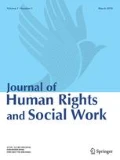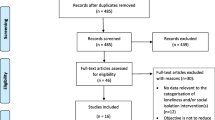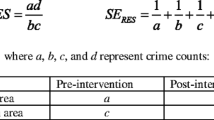Abstract
The Human Rights Triptych, consisting briefly of the U.N. Universal Declaration of Human Rights, at its center; guiding principles, declarations, and conventions on the right panel; and implementation measures on the left, can serve as guidelines for whistleblowers to engage in defending human rights and for states to protect them. Whereas whistleblowing generally refers to those in organizations exposing abuses, this article expands that notion to include unethical practices in the helping and health professions broadly defined. By way of example, it pays attention to issues pertaining to the promotion of mental health/well-being. With the metaphor of saving victims downstream from a burning ship, this essay contends that whistleblowing often comes too late. While important to save drowning victims, one must also put out the fire upstream. The whistleblower, referred to interchangeably here as a human rights defender, ought to be concerned about ethics, which may be intuitive, but human rights documents elucidate. S/he must be on the lookout for proactive measures to promote mental health, rather than reactive measures alone. Defending human rights, thus directly consistent with advanced generalist practice, can take place at various levels of intervention: the meta-macro, macro, mezzo, micro, and meta-micro.
Similar content being viewed by others
References
Alston, P. (2017). Report by special rapporteur on extreme poverty on his visit to the United States of America. 38th session of the Human Rights Council, June 18-July 6, 2018. HRC/38/33.Add1 Geneva: Human Rights Council.
Bednarski, J. (1970). The Salem witch-scare viewed sociologically. In F. Newman & D. Weissbrodt (Eds.), International human rights: law, policy, and process (2nd. Ed.) (pp. 745–747). Cincinnati: Anderson.
Campanini, A. (2019). President of the International Association of Schools of Social Work (IASSW). Keynote address on “The role of social work to support the SDGs and Social Development” at the 21st Biannual Conference of the International Consortium on Social Development (ICSD), Yogyakarta, Indonesia. For further information contact: annamaria@iassw-aiets
Creating a Human Rights Culture. (2019). At: www.humanrightsculture.org Retrieved: July 30, 2019.
Duha, R. (2018). How Gandhi gave India a sense of dignity and national purpose. At: https://qz.com/india/1409887/gandhis-methods-gave-india-dignity-and-purpose-says-ramachandra-guha/ Retrieved July 30, 2019.
Edward Snowden, Whistleblower (2014). The New York Times. At: https://www.nytimes.com/2014/01/02/opinion/edward-snowden-whistle-blower.html?searchResultPosition=3 Retrieved: July 31, 2019.
Fortin, J. (2019). The New York Times. Chelsea Manning ordered back to jail for her refusal to testify against Wikileaks. At: https://www.nytimes.com/2019/05/16/us/chelsea-manning-jail.html?searchResultPosition=9 Retrieved: July 30, 2019.
Gil, D. (1973). Violence against children. Cambridge: Harvard University Press.
Gil, D. (1992). Unravelling social policy. (Rev. 5th ed.). Rochester: Schenkman.
Gil, D. (2013). Confronting social injustice: concepts and strategies for social workers (Rev. ed.). NY: Columbia University Press.
Global Social Work Statement of Ethical Principles. (2018). At: https://www.ifsw.org/global-social-work-statement-of-ethical-principles/ Retrieved: October 7, 2019.
Harris, J., & White, V. (Eds.). (2018). Oxford Dictionary of Social Work and Social Care (2nd ed.). London: Oxford University Press At: https://www.oxfordreference.com/view/10.1093/acref/9780198796688.001.0001/acref-9780198796688-e-1577?rskey=YoDcMY&result=2 Retrieved: October 9, 2019.
King, M. L. (1963). Letter from a Birmingham Jail. At: https://www.africa.upenn.edu/Articles_Gen/Letter_Birmingham.html Retrieved October 5, 2019
Medical Whistleblower Advocacy Network. (2019). Mass murder and psychiatric drugs. At: http://medicalwhistlebloweradvocacynetwork.com/mass-murder-and-psychiatric-drugs Retrieved: October 18, 2019.
NANA.org. (2019). At: http://nana.com/regional/about-us/mission/values/. Retrieved June 19, 2019.
Office of the High Commissioner for Human Rights. (2018). Raising the visibility of human rights defenders. At: http://www.ohchr.org/Documents/Issues/Defenders/20Anniversary/CN-EN.pdf Retrieved: November 19, 2019.
PDHRE.org. (2018) People’s Movement for Human Rights Learning At: http://www.pdhre.org/projects/hrcommun.html Retrieved: June 1, 2019.
Ryan-Mosley, T. (2019). US health costs are soaring. MIT Technology Review, Old Age is Over, 122(5), 57.
Snowden, E. (2019). Permanent record. NY: Metropolitan.
United Nations Office of the High Commissioner for Human Rights. (2018) At: http://www.ohchr.org/EN/Issues/SRHRDefenders/Pages/20thAnniversary.aspx Retrieved June 19, 2019
Ta’ Shunke Witko. (2018). Crazy horse. At: http://www.indigenouspeople.net/crazyhor.htm Retrieved: June 20, 2019
Weissbrodt, D., Fionnuala, N., Fitzpatrick, J., & Newman, F. (Eds.) (2009). International human rights: Law, policy, and process LexisNexis (ASIN: B01JXRC440)
Wronka, J. (1998). Human rights and social policy in the 21st century: a comparison of the United Nations Universal Declaration of Human Rights with United States Federal and State Constitutions (rev. ed.). Lanham: University Press of America.
Wronka, J. (2017). Human rights and social justice: social action and service for the helping and health professions (2nd. Ed.). Los Angeles: Sage.
Author information
Authors and Affiliations
Corresponding author
Additional information
Publisher’s Note
Springer Nature remains neutral with regard to jurisdictional claims in published maps and institutional affiliations.
Rights and permissions
About this article
Cite this article
Wronka, J. Whistleblowing, Human Rights, and Mental Health/Well-being: Implications for Advanced Generalist Practice. J. Hum. Rights Soc. Work 5, 22–27 (2020). https://doi.org/10.1007/s41134-019-00112-1
Published:
Issue Date:
DOI: https://doi.org/10.1007/s41134-019-00112-1




